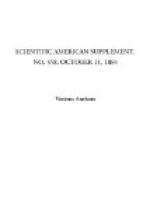Scientifically, then, in the present state of our knowledge we are unable to affirm anything on this point. Practically, we are not much further advanced. It is very probable that the combination of hydraulic purification with a forced cultivation of the soil has sometimes determined changes in its composition by which it has been rendered sterile as regards malaria. If that has happened, it has happened by chance, and we are unable to reproduce the result at will; for we have not all the data which might enable us to understand how it has come about. Most of the purifications obtained in ancient times, by means of forced cultivation, continued during centuries, have not been definite at all, but the production of malaria has been simply suspended. Hardly was the regular cultivation of the fields interrupted than the production of malaria recommenced. Among the numerous examples that I might cite in this connection, I will limit myself to that of the Roman Campagna. This seemed to have been made permanently healthy under the Antonii, but after the fall of the empire it began again to produce malaria, as if the forced cultivation through so many centuries had never been.
One might, strictly speaking, be content with such a result, and boldly undertake forced cultivation of all malarious districts, without stopping to ascertain whether the freedom from malaria so obtained would be definite, or whether the production of the poison were only suspended. Unfortunately, one is never sure of arriving at such a result, and no one can say, a priori, whether the forced cultivation of a given malarious tract will render it healthful. It must always be remembered that the first effect of forced cultivation, which requires an overturning of the soil by means of the plow, the spade, and the pick, is an unfortunate one, from a hygienic point of view, whenever we have to deal with a malarious country. Experience has shown, especially in Italy and America, that this overturning of the soil almost invariably increases the local production of malaria. And this can be readily understood, since the plowing and the digging in a soil containing the specific ferment increase the extent of surface of the ground in immediate contact with the atmosphere. This first mischievous effect is often gradually weakened by the continued cultivation, and may end by disappearing. At other times, on the contrary, it persists obstinately, and one is often forced in desperation to the resolve to level the ground again and to varnish it, so to speak, with a thick sowing of grass, if he wishes to suspend or weaken the malarial production.




